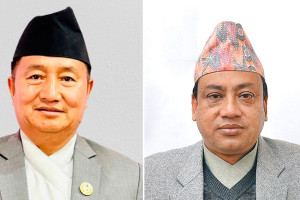Money
Birgunj and Raxaul customs offices to open seven days a week
Nepal and India have agreed to keep their respective customs offices in Birgunj and Raxaul open seven days a week in a bid to speed up customs clearance
Currently, shipments are cleared through customs only on five days of the week as Nepal observes the weekend on Saturday while Sunday is the weekly day off in India.
During a meeting held between the directors general of the customs offices in Kathmandu, it was agreed that India would keep the Raxaul Customs Office open from 8 am to 8 pm daily.
Director General Surya Prasad Acharya of the Department of Customs led the Nepali team while Indian side was led by Shobha L Chary, member of the Central Board of Excise and Customs.
Acharya said that the provision would help Nepali traders by reducing the time spent on customs clearance and expedite shipments. “This will minimize their shipment costs,” he added.
More than 60 percent of the country’s imports enter through the Birgunj-Raxaul customs points. Despite the large volume of traffic, traders have been facing problems because cargo is held up at customs due to the extended weekend with Nepal and India taking consecutive days off.
The 16th annual bilateral meeting discussed 11 topics related to trade facilitation. Among them, six were related to unauthorised trade being carried across the Nepal-India border while three were about developing infrastructure in the border regions.
During the talks, India agreed to help Nepal by rushing customs clearance of Nepali cargo at Kolkata and Haldia ports in coordination with the authorities there. “As part of this initiative, India has agreed to provide 24-hour customs clearance facility daily for Nepali shipments,” said Acharya.
Likewise, the Indian side agreed to work towards reducing the demurrage that Nepali traders are forced to pay as they have to keep their cargo at Kolkata port due to delays in customs clearance.
The Indian side also agreed to assign an assistant commissioner at the Mechi-Panitanki customs point three days a week to facilitate customs clearance of goods worth IRs 100,000. The Indian assistant commissioner will inform in advance his or her counterpart in Nepal when he or she will be on duty.
Currently, traders importing goods worth more than IRs 100,000 have to wait for days until a senior Indian official arrives to handle the paperwork. India has also agreed to construct a food testing laboratory and provide banking services at the Panitanki customs point adjoining the Nepali border. These services are presently available at a distance of 8 km from the border.
Likewise, the two sides also agreed to draft a policy on the transhipment facility to be provided to Nepal enabling it to get customs clearance at Raxaul and not in Kolkata. Regarding Nepal’s request to remove the local tax being imposed by the Uttar Pradesh state government on its rosin turpentine, the Indian side agreed to coordinate with the concerned Indian agency for removal of such taxes.
“India also agreed in principle to remove the additional duty being imposed on readymade garments, brass and copper utensils and tobacco products,” said Acharya.
Meanwhile, Nepal has urged India to complete the construction of the Integrated Check Points (ICP) proposed in Birgunj, Bhairahawa and Nepalgunj.
“We have requested India to complete the detailed project report of the Birgunj ICP where 50 percent of the construction work has been completed. Similarly, we asked India to start construction of ICPs in Bhairahawa and Nepalgunj where land acquisition has been done,” said Acharya. The two countries have signed an agreement under which India will develop ICPs on both sides of the border.




 24.1°C Kathmandu
24.1°C Kathmandu















